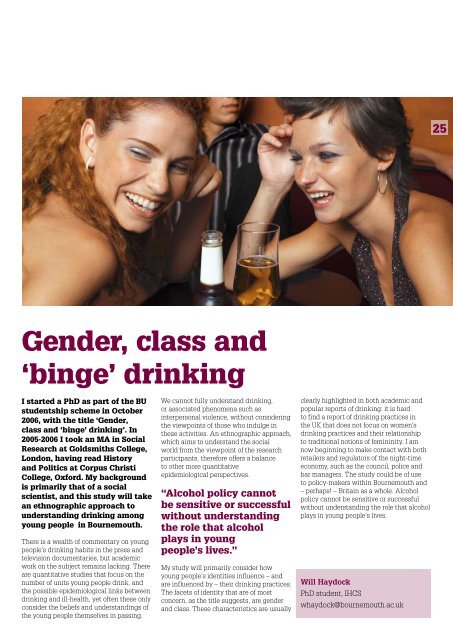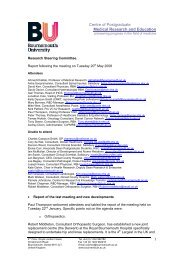Issue 9 (PDF 1.26 mb) - Bournemouth University
Issue 9 (PDF 1.26 mb) - Bournemouth University
Issue 9 (PDF 1.26 mb) - Bournemouth University
You also want an ePaper? Increase the reach of your titles
YUMPU automatically turns print PDFs into web optimized ePapers that Google loves.
Gender, class and<br />
‘binge’ drinking<br />
I started a PhD as part of the BU<br />
studentship scheme in October<br />
2006, with the title ‘Gender,<br />
class and ‘binge’ drinking’. In<br />
2005-2006 I took an MA in Social<br />
Research at Goldsmiths College,<br />
London, having read History<br />
and Politics at Corpus Christi<br />
College, Oxford. My background<br />
is primarily that of a social<br />
scientist, and this study will take<br />
an ethnographic approach to<br />
understanding drinking among<br />
young people in <strong>Bournemouth</strong>.<br />
There is a wealth of commentary on young<br />
people’s drinking habits in the press and<br />
television documentaries, but academic<br />
work on the subject remains lacking. There<br />
are quantitative studies that focus on the<br />
nu<strong>mb</strong>er of units young people drink, and<br />
the possible epidemiological links between<br />
drinking and ill-health, yet often these only<br />
consider the beliefs and understandings of<br />
the young people themselves in passing.<br />
We cannot fully understand drinking,<br />
or associated phenomena such as<br />
interpersonal violence, without considering<br />
the viewpoints of those who indulge in<br />
these activities. An ethnographic approach,<br />
which aims to understand the social<br />
world from the viewpoint of the research<br />
participants, therefore offers a balance<br />
to other more quantitative<br />
epidemiological perspectives.<br />
“Alcohol policy cannot<br />
be sensitive or successful<br />
without understanding<br />
the role that alcohol<br />
plays in young<br />
people’s lives.”<br />
My study will primarily consider how<br />
young people’s identities influence – and<br />
are influenced by – their drinking practices.<br />
The facets of identity that are of most<br />
concern, as the title suggests, are gender<br />
and class. These characteristics are usually<br />
clearly highlighted in both academic and<br />
popular reports of drinking: it is hard<br />
to find a report of drinking practices in<br />
the UK that does not focus on women’s<br />
drinking practices and their relationship<br />
to traditional notions of femininity. I am<br />
now beginning to make contact with both<br />
retailers and regulators of the night-time<br />
economy, such as the council, police and<br />
bar managers. The study could be of use<br />
to policy-makers within <strong>Bournemouth</strong> and<br />
– perhaps! – Britain as a whole. Alcohol<br />
policy cannot be sensitive or successful<br />
without understanding the role that alcohol<br />
plays in young people’s lives.<br />
Will Haydock<br />
PhD student, IHCS<br />
whaydock@bournemouth.ac.uk<br />
25










